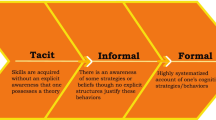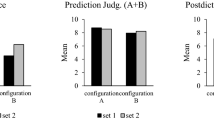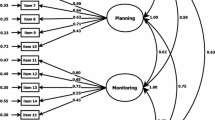Abstract
The purpose of this study was to use multiple assessments to investigate the general versus task-specific characteristics of metacognition in dissimilar chemistry topics. This mixed-method approach investigated the nature of undergraduate general chemistry students’ metacognition using four assessments: a self-report questionnaire, assessment of concurrent metacognitive skills, confidence judgment, and calibration accuracy. Data were analyzed using a multitrait–multimethod correlation matrix, supplemented with regression analyses, and qualitative interpretation. Significant correlations among task performance, calibration accuracy, and concurrent metacognition within a task suggest a converging relationship. Confidence judgment, however, was not associated with task performance or the other metacognitive measurements. The results partially support hypotheses of both general and task-specific metacognition. However, general and task-specific properties of metacognition were detected using different assessments. Case studies were constructed for two participants to illustrate how concurrent metacognition varied within different task demands. Considerations of how each assessment may appropriate different metacognitive constructs and the importance of the alignment of analytical constructs when using multiple assessments are discussed. These results may help lead to improvements in metacognition assessment and may provide insights into designs of effective metacognitive instruction.
Similar content being viewed by others
References
Azevedo, R. (2005). Using hypermedia as a metacognitive tool for enhancing student learning? The role of self-regulated learning. Educational Psychologist, 40(4), 199–209.
Boekaerts, M., & Corno, L. (2005). Self-regulation in the classroom: A perspective on assessment and intervention. Applied Psychology, 54(2), 199–231.
Bonett, D. G., & Wright, T. A. (2000). Sample size requirements for estimating Pearson, Kendall and Spearman correlations. Psychometrika, 65(1), 23–28.
Burkett, C., & Azevedo, R. (2012). The effect of multimedia discrepancies on metacognitive judgments. Computers in Human Behavior, 28(4), 1276–1285.
Campbell, D. T., & Fiske, D. W. (1959). Convergent and discriminant validation by the multitrait–multimethod matrix. Psychological Bulletin, 56(2), 81–105.
Chiu, J., & Linn, M. (2012). The role of self-monitoring in learning chemistry with dynamic visualizations. In A. Zohar & Y. J. Dori (Eds.), Metacognition in science education: Trends in current research (pp. 133–163). Dordrecht: Springer.
Clarebout, G., Elen, J., & Onghena, P. (2006). In search of the reliability of a Flemish version of the knowledge monitoring assessment test. Metacognition and Learning, 1(2), 137–147.
Cleary, T. J. (2011). Emergence of self-regulated learning microanalysis: Historical overview, essential features, and implications for research and practice. In B. J. Zimmerman & D. H. Schunk (Eds.), Handbook of self-regulation of learning and performance (pp. 329–345). New York: Routledge.
Conner, L. (2007). Cueing metacognition to improve researching and essay writing in a final year high school biology class. Research in Science Education, 37(1), 1–16.
Cooper, M. M., & Sandi-Urena, S. (2009). Design and validation of an instrument to assess metacognitive skillfulness in chemistry problem solving. Journal of Chemical Education, 86(2), 240–245.
Cooper, M. M., Sandi-Urenab, S., & Stevens, R. (2008). Reliable multi method assessment of metacognition use in chemistry problem solving. Chemistry Education Research and Practice, 9, 18–24.
Coutinho, S., Wiemer-Hastings, K., Skowronski, J. J., & Britt, M. A. (2005). Metacognition, need for cognition and use of explanations during ongoing learning and problem solving. Learning and Individual Differences, 15(4), 321–337.
Cromley, J. G., Snyder-Hogan, L. E., & Luciw-Dubas, U. A. (2010). Cognitive activities in complex science text and diagrams. Contemporary Educational Psychology, 35(1), 59–74.
David, F. N. (1938). Tables of the ordinates and probability integral of the distribution of the correlation coefficient in small samples. New York: Cambridge University Press.
Desoete, A., Roeyers, H., & De Clercq, A. (2003). Can offline metacognition enhance mathematical problem solving? Journal of Educational Psychology, 95(1), 188–200.
Dinsmore, D. L., & Parkinson, M. M. (2013). What are confidence judgments made of? Students’ explanations for their confidence ratings and what that means for calibration. Learning and Instruction, 24, 4–14.
Dunlosky, J., & Rawson, K. A. (2012). Overconfidence produces underachievement: Inaccurate self evaluations undermine students’ learning and retention. Learning and Instruction, 22(4), 271–280.
Dunlosky, J., & Thiede, K. W. (2013). Four cornerstones of calibration research: Why understanding students’ judgments can improve their achievement. Learning and Instruction, 24, 58–61.
Efklides, A. (2006). Metacognition and affect: What can metacognitive experiences tell us about the learning process? Educational Research Review, 1(1), 3–14.
Ertmer, P. A., & Newby, T. J. (1996). The expert learner: Strategic, self-regulated, and reflective. Instructional Science, 24(1), 1–24.
Fisher, R. A. (1932). Statistical methods for research workers. London: Oliver & Boyd.
Flavell, J. H., Miller, P. H., & Miller, S. A. (2002). Cognitive development (4th ed.). Upper Saddle River: Prentice Hall.
Ford, C. L., & Yore, L. D. (2012). Toward convergence of critical thinking, metacognition, and reflection: Illustrations from natural and social sciences, teacher education, and classroom practice. In A. Zohar & Y. J. Dori (Eds.), Metacognition in science education: Trends in current research (pp. 251–271). Dordrecht: Springer.
Furió, C., Calatayud, M. L., Bárcenas, S. L., & Padilla, O. M. (2000). Functional fixedness and functional reduction as common sense reasonings in chemical equilibrium and in geometry and polarity of molecules. Science Education, 84(5), 545–565.
Georghiades, P. (2006). The role of metacognitive activities in the contextual use of primary pupils’ conceptions of science. Research in Science Education, 36(1–2), 29–49.
Greene, J. A., & Azevedo, R. (2009). A macro-level analysis of SRL processes and their relations to the acquisition of a sophisticated mental model of a complex system. Contemporary Educational Psychology, 34(1), 18–29.
Hong, E., & Peng, Y. (2008). Do Chinese students’ perceptions of test value affect test performance? Mediating role of motivational and metacognitive regulation in test preparation. Learning and Instruction, 18(6), 499–512.
Howard, B. C., McGee, S., Shia, R., & Hong, N. S. (2000). Metacognitive self-regulation and problem-solving: Expanding the theory base through factor analysis. Paper presented at the annual meeting of the American Educational Research Association, New Orleans, LA. Retrieved from ERIC database. (ED470973)
Kelemen, W. L., Frost, P. J., & Weaver, C. A. (2000). Individual differences in metacognition: Evidence against a general metacognitive ability. Memory & Cognition, 28(1), 92–107.
Koch, A. (2001). Training in metacognition and comprehension of physics texts. Science Education, 85(6), 758–768.
Koriat, A., & Levy-Sardot, R. (1999). Processes underlying metacognitive judgments: Information-based and experience-based monitoring of one’s own knowledge. In S. Chaiken & Y. Trope (Eds.), Dual-process theories in social psychology (pp. 483–502). New York: Guilford.
Kramarski, B., Mevarech, Z. R., & Lieberman, A. (2001). Effects of multilevel versus unilevel metacognitive training on mathematical reasoning. Journal of Educational Research, 94(5), 292–300.
Leou, M., Abder, P., Riordan, M., & Zoller, U. (2006). Using ‘HOCS-centered learning’ as a pathway to promote science teachers' metacognitive development. Research in Science Education, 36(1–2), 69–84.
Loverude, M. E., Kautz, C. H., & Heron, P. R. L. (2002). Student understanding of the first law of thermodynamics: Relating work to the adiabatic compression of an ideal gas. American Journal of Physics, 70(2), 137–148.
Maki, R. H., Shields, M., Wheeler, A. E., & Zacchilli, T. L. (2005). Individual differences in absolute and relative metacomprehension accuracy. Journal of Educational Psychology, 97(4), 723–731.
Meltzer, D. E. (2004). Investigation of students’ reasoning regarding heat, work, and the first law of thermodynamics in an introductory calculus-based general physics course. American Journal of Physics, 72(11), 1432–1446.
Moos, D. C., & Azevedo, R. (2008). Monitoring, planning, and self-efficacy during learning with hypermedia: The impact of conceptual scaffolds. Computers in Human Behavior, 24(4), 1686–1706.
Muis, K. R., Winne, P. H., & Jamieson-Noel, D. (2007). Using a multitrait-multimethod analysis to examine conceptual similarities of three self-regulated learning inventories. British Journal of Educational Psychology, 77(1), 177–195.
Nietfeld, J. L., & Schraw, G. (2002). The effect of knowledge and strategy training on monitoring accuracy. Journal of Educational Research, 95(3), 131–142.
Nietfeld, J. L., Cao, L., & Osborne, J. W. (2005). Metacognitive monitoring accuracy and student performance in the postsecondary classroom. Journal of Experimental Education, 74(1), 7–28.
Ozuru, Y., Kurby, C. A., & McNamara, D. S. (2012). The effect of metacomprehension judgment task on comprehension monitoring and metacognitive accuracy. Metacognition and Learning, 7(2), 113–131.
Peterson, R. F., Treagust, D. F., & Garnett, P. (1989). Development and application of a diagnostic instrument to evaluate grade-11 and -12 students’ conceptions of covalent bonding and structure following a course of instruction. Journal of Research in Science Teaching, 26(4), 301–314.
Pieschl, S. (2009). Metacognitive calibration—an extended conceptualization and potential applications. Metacognition and Learning, 4(1), 3–31.
Pieschl, S., Stahl, E., Murray, T., & Bromme, R. (2012). Is adaptation to task complexity really beneficial for performance? Learning and Instruction, 22(4), 281–289.
Pintrich, P. R., Smith, D. A. F., Garcia, T., & Mckeachie, W. J. (1993). Reliability and predictive validity of the motivated strategies for learning questionnaire (MSLQ). Educational and Psychological Measurement, 53(3), 801–813.
Prins, F. J., Veenman, M. V. J., & Elshout, J. J. (2006). The impact of intellectual ability and metacognition on learning: New support for the threshold of problematicity theory. Learning and Instruction, 16(4), 374–387.
Reyes, M. L. (2011). Domain specificity of motivation and learning strategies: Filipino science high school students’ profiles in science and social studies. Asia-Pacific Education Researcher, 20(2), 308–321.
Rotgans, J., & Schmidt, H. (2009). Examination of the context–specific nature of self–regulated learning. Educational Studies, 35(3), 239–253.
Sandi-Urena, S., Cooper, M. M., & Stevens, R. H. (2010). Enhancement of metacognition use and awareness by means of a collaborative intervention. International Journal of Science Education, 33(3), 323–340.
Schellings, G. (2011). Applying learning strategy questionnaires: Problems and possibilities. Metacognition and Learning, 6(2), 91–109.
Schellings, G., & Broekkamp, H. (2011). Signaling task awareness in think-aloud protocols from students selecting relevant information from text. Metacognition and Learning, 6(1), 65–82.
Schneider, W., Schlagmüller, M., & Visé, M. (1998). The impact of metamemory and domain-specific knowledge on memory performance. European Journal of Psychology of Education, 13(1), 91–103.
Schraw, G. (1995). Measures of feeling-of-knowing accuracy: A new look at an old problem. Applied Cognitive Psychology, 9(4), 321–332.
Schraw, G. (2009). A conceptual analysis of five measures of metacognitive monitoring. Metacognition and Learning, 4(1), 33–45.
Schraw, G., Dunkle, M. E., Bendixen, L. D., & Roedel, T. D. (1995). Does a general monitoring skill exist? Journal of Educational Psychology, 87(3), 433–444.
Schraw, G., Crippen, K. J., & Hartley, K. (2006). Promoting self-regulation in science education: Metacognition as part of a broader perspective on learning. Research in Science Education, 36(1–2), 111–139.
Schwartz, D. L., Bransford, J. D., & Sears, D. (2005). Efficiency and innovation in transfer. In J. P. Mestre (Ed.), Transfer of learning from a modern multidisciplinary perspective (pp. 1–51). Greenwich: Information Age.
Shin, N., Jonassen, D. H., & McGee, S. (2003). Predictors of well-structured and ill-structured problem solving in an astronomy simulation. Journal of Research in Science Teaching, 40(1), 6–33.
Son, L. K., & Metcalfe, J. (2005). Judgments of learning: Evidence for a two-stage process. Memory & Cognition, 33(6), 1116–1129.
Song, C., Kanai, R., Fleming, S. M., Weil, R. S., Schwarzkopf, D. S., & Rees, G. (2011). Relating inter-individual differences in metacognitive performance on different perceptual tasks. Consciousness & Cognition, 20(4), 1787–1792.
Sperling, R. A., Howard, B. C., Miller, L. A., & Murphy, C. (2002). Measures of children’s knowledge and regulation of cognition. Contemporary Educational Psychology, 27(1), 51–79.
Taber, K. S. (2002). Chemical misconception—Prevention, diagnosis and cure: vol. I: Theoretical background. London: Royal Society of Chemistry.
Thomas, G. P. (2013). Changing the metacognitive orientation of a classroom environment to stimulate metacognitive reflection regarding the nature of physics learning. International Journal of Science Education, 35(7), 1183–1207.
Thomas, P. L., & Schwenz, R. W. (1998). College physical chemistry students’ conceptions of equilibrium and fundamental thermodynamics. Journal of Research in Science Teaching, 35(10), 1151–1160.
van der Stel, M., & Veenman, M. V. J. (2008). Relation between intellectual ability and metacognitive skillfulness as predictors of learning performance of young students performing tasks in different domains. Learning and Individual Differences, 18(1), 128–134.
van der Stel, M., & Veenman, M. V. J. (2010). Development of metacognitive skillfulness: A longitudinal study. Learning and Individual Differences, 20(3), 220–224.
van Loon, M. H., de Bruin, A. B. H., van Gog, T., & van Merriënboer, J. J. G. (2013). Activation of inaccurate prior knowledge affects primary-school students’ metacognitive judgments and calibration. Learning and Instruction, 24, 15–25.
Veenman, M. V. J. (2012). Metacognition in science education: Definitions, constituents, and their intricate relation with cognition. In A. Zohar & Y. J. Dori (Eds.), Metacognition in science education: Trends in current research (pp. 21–36). Dordrecht: Springer.
Veenman, M. V. J., & Spaans, M. A. (2005). Relation between intellectual and metacognitive skills: Age and task differences. Learning and Individual Differences, 15(2), 159–176.
Veenman, M. V. J., & Verheij, J. (2003). Identifying technical students at risk: Relating general versus specific metacognitive skills to study success. Learning and Individual Differences, 13, 259–272.
Veenman, M. V. J., Elshout, J. J., & Meijer, J. (1997). The generality vs. domain-specificity of metacognitive skills in novice learning across domains. Learning and Instruction, 7(2), 187–209.
Veenman, M. V. J., van Hout-Wolters, B. H. A. M., & Afflerbach, P. (2006). Metacognition and learning: Conceptual and methodological considerations. Metacognition and Learning, 1(1), 3–14.
Vidal-Abarca, E., Mañá, A., & Gil, L. (2010). Individual differences for self-regulating task-oriented reading activities. Journal of Educational Psychology, 102(4), 817–826.
Wang, C.-Y. (2007). The role of mental-modeling ability, content knowledge, and mental models in general chemistry students’ understanding about molecular polarity (Doctoral dissertation). Columbia: University of Missouri.
Wang, C.-Y. (2013). Scaffolding middle school students’ construction of scientific explanations. Paper presented at the biannual conference of the European Science Education Research Association, Nicosia, Cyprus.
Wang, C.-Y., & Barrow, L. H. (2011). Characteristics and levels of sophistication: An analysis of chemistry students’ ability to think with mental models. Research in Science Education, 41(4), 561-586
Wang, J.-R., & Chen, S.-F. (2014). Exploring mediating effect of metacognitive awareness on comprehension of science texts through structural equation modeling analysis. Journal of Research in Science Teaching, 51, 175–191.
Winne, P. H., & Hadwin, A. F. (1998). Studying as self-regulated learning. In D. J. Hacker, J. Dunlosky, & A. C. Graesser (Eds.), Metacognition in educational theory and practice (pp. 277–304). Mahwah: Lawrence Erlbaum.
Winne, P. H., & Jamieson-Noel, D. (2002). Exploring students’ calibration of self reports about study tactics and achievement. Contemporary Educational Psychology, 27(4), 551–572.
Winne, P. H., & Perry, N. E. (2000). Measuring self-regulated learning. In M. Boekaerts, M. Zeidner, & P. R. Pintrich (Eds.), Handbook of self-regulation (pp. 531–566). San Diego: Academic.
Winne, P. H., Jamieson-Noel, D., & Muis, K. (2002). Methodological issues and advances in researching tactics, strategies, and self-regulated learning. In P. R. Pintrich & M. L. Maehr (Eds.), Advances in motivation and achievement: New directions in measures and methods (pp. 121–155). Greenwich: JAI Press.
Wolters, C. A., & Pintrich, P. R. (1998). Contextual differences in student motivation and self-regulated learning in mathematics, English, and social studies classrooms. Instructional Science, 26, 27–47.
Yürük, N., Beeth, M. E., & Andersen, C. (2009). Analyzing the effect of metaconceptual teaching practices on students’ understanding of force and motion concepts. Research in Science Education, 39(4), 449–475.
Zohar, A., & Barzilai, S. (2013). A review of research on metacognition in science education: Current and future directions. Studies in Science Education, 49(2), 121–169.
Acknowledgments
Funding for this research work was supported by the National Science Council, Taiwan, under grant numbers NSC 98-2511-S-009-008 and NSC 99-2511-S-009-002-MY2. The author would also like to thank professor David E. Meltzer for the use of interview questions and the Center of Educational Technology at Wheeling Jesuit University for the use of the Inventory of Metacognitive Self-Regulation.
Author information
Authors and Affiliations
Corresponding author
Rights and permissions
About this article
Cite this article
Wang, CY. Exploring General Versus Task-Specific Assessments of Metacognition in University Chemistry Students: A Multitrait–Multimethod Analysis. Res Sci Educ 45, 555–579 (2015). https://doi.org/10.1007/s11165-014-9436-8
Published:
Issue Date:
DOI: https://doi.org/10.1007/s11165-014-9436-8




